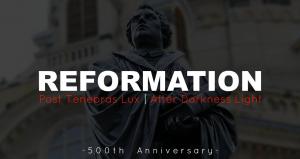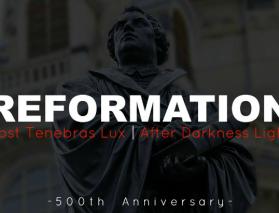 As the 500th anniversary of the Reformation marches nearer, it behooves us to examine anew the differences between the Roman Catholic and Protestant doctrine. What differences were so important that both sides felt that they could not compromise on them? What were (and are) the core disagreements between the Roman Catholic and Protestant churches? The doctrine of Justification is one that forms the core disagreement between the Roman Catholics and Protestants.[1] This doctrine is of vital importance for the Christian because it is at the heart of how a sinner is made right before God. The discussion of justification focuses largely on the writings of Paul in the New Testament and the purpose of these articles is to lay out both the Roman Catholic and the Historic Protestant views of justification and then compare them to what Paul has to say on the matter. Much ink has been sacrificed on the altar of justification by faith and we do not presume by any means to solve the dispute – ours is not the first nor the last word to be said on the subject. However, that does not mean that it is not worth discussing; it is clear that Paul supports one side rather than the other. In our discussions of the Roman Catholic view, we will use primarily the documents produced at the Council of Trent and the Catechism of the Catholic Church.
As the 500th anniversary of the Reformation marches nearer, it behooves us to examine anew the differences between the Roman Catholic and Protestant doctrine. What differences were so important that both sides felt that they could not compromise on them? What were (and are) the core disagreements between the Roman Catholic and Protestant churches? The doctrine of Justification is one that forms the core disagreement between the Roman Catholics and Protestants.[1] This doctrine is of vital importance for the Christian because it is at the heart of how a sinner is made right before God. The discussion of justification focuses largely on the writings of Paul in the New Testament and the purpose of these articles is to lay out both the Roman Catholic and the Historic Protestant views of justification and then compare them to what Paul has to say on the matter. Much ink has been sacrificed on the altar of justification by faith and we do not presume by any means to solve the dispute – ours is not the first nor the last word to be said on the subject. However, that does not mean that it is not worth discussing; it is clear that Paul supports one side rather than the other. In our discussions of the Roman Catholic view, we will use primarily the documents produced at the Council of Trent and the Catechism of the Catholic Church.
The Roman Catholic View
The Catholic Church believes that God grants justification in baptism. The Catechism of the Catholic Church says, “The Most Holy Trinity gives the baptized sanctifying grace, the grace of justification.”[2] It also says, “Justification is conferred in Baptism, the sacrament of faith.”[3] The Council of Trent says, “the Justification of the impious…cannot be effected, without the laver of regeneration”[4] and that, “the instrumental cause [of justification] is baptism.”[5] Clearly, in the Roman Catholic understanding the grace of justification is first given in baptism. The Catholic Church believed so strongly that baptism was necessary for justification that it said,
If any one saith, that the sacraments of the New Law are not necessary unto salvation, but superfluous; and that, without them, or without the desire thereof, men obtain of God, through faith alone, the grace of justification; – though all (the sacraments) are not indeed necessary for every individual; let him be anathema.[6]
This justification, given at baptism, is more than a simple declaration; it contains in it sanctification, which can already be seen by the equating of “sanctifying grace” and “the grace of justification” above. Paragraph 1266 of the Catholic Catechism goes on to say that the effects of the grace of justification given in baptism are,
Enabling them to believe in God, to hope in him, and to love him through the theological virtues; giving them the power to live and act under the prompting of the Holy Spirit through the gifts of the Holy Spirit; allowing them to grow in goodness through the moral virtues.[7]
Not only is justification the forgiveness of sins, but it is “also the sanctification and renewal of the interior man.”[8] The grace given in baptism is “infused by the Holy Spirit into the soul to heal it of sin and to sanctify it.”[9] It “detaches man from sin…and purifies his heart…it frees from the enslavement to sin, and it heals.”[10] In justification, the gifts faith, hope, and charity are poured or infused into our hearts along with the ability to obey God’s will.[11] This explains the language used in the Council of Trent and the Catechism that justification “conforms us to the righteousness of God”[12] and “maketh us just.”[13] The words of paragraph 1995 of the Catechism sum it up nicely, “justification entails the sanctification of his whole being.”[14]
Before we go any further, it should be noted that the Roman Catholic Church affirms justification by faith. Chapter VIII of the Council of Trent is worth quoting at length on this,
In what manner it is to be understood, that the impious is justified by faith, and gratuitously. And whereas the Apostle saith, that man is justified by faith and freely, those words are to be understood in that sense which the perpetual consent of the Catholic Church hath held and expressed; to wit, that we are therefore said to be justified by faith, because faith is the beginning of human salvation, the foundation, and the root of all Justification; without which it is impossible to please God, and to come unto the fellowship of His sons: but we are therefore said to be justified freely, because that none of those things which precede justification – whether faith or works – merit the grace itself of justification. For, if it be a grace, it is not now by works, otherwise, as the same Apostle says, grace is no more grace.[15]
Whatever disagreement Protestants may have with certain points in the preceding paragraph, it should not be denied that the Catholic Church views faith to be, at the very least, necessary for justification. In addition to affirming the necessity of faith, the Catechism goes slightly further and affirms, “no one can merit the initial grace of forgiveness, at the beginning of conversion.”[16] Justification is initially given by the grace of God and is not merited by the works of the one justified.
However, while it is plain that the Roman Catholic Church teaches that faith is necessary for justification and no one can merit initial justification, it also teaches that those who have been justified can, by their own good works, increase in justification and merit for themselves further graces. The Council of Trent says that we can, “through the observance of the commandments of God and of the church, faith co-operating with good works, increase in that justice which they have received through the grace of Christ, and are still further justified.”[17] Paragraph 2010 of the Catechism says, “Moved by the Holy Spirit and by charity, we can then merit for ourselves and for others the graces needed for our sanctification, for the increase of grace and charity, and for the attainment of eternal life.”[18] The Roman Catholic Church understands justification to be dynamic instead of static, in that it can increase and, as we shall see, decrease.
Having introduced the subject of merit, it is fitting to discuss how it relates to the Roman Catholic scheme of justification. The Catechism defines merit as “the recompense owed by a community or a society for the action of one of its members, experienced either as beneficial or harmful, deserving reward or punishment.”[19] No one can gain merit before God because everything that man has he has received from God; therefore, God owes him nothing.[20] The Christian can only be said to merit anything before God because “God has freely chosen to associate man with the work of his grace.”[21] Because one must rely on the grace of God both to do good works and to associate him with the merit of good works – the Catholic Church can say of those Christians who do good works, “their merits were pure grace.”[22] The Council of Trent says that Christ “infuses” his virtue into the justified and that the justice of God is “infused into us through the merit of Christ”. In this way, “we are justified from its [justice] being inherent in us” and there is nothing to prevent the justified from being accounted to have, “by those very works which have been done in God, fully satisfied the divine law according to the state of life, have truly merited eternal life.”[23] Therefore, for the Catholic Church, merit truly plays an important role in justification and is essential to the increase of the grace of justification.
Because the Roman Catholic Church views justification as an ongoing process that involves cooperation between human and divine will, it holds that those who have once been justified can lose their salvation by committing “mortal sins.” The Council of Trent says, “the received grace of justification is lost, not only by infidelity whereby even faith itself is lost, but also by any other mortal sin whatever, though faith be not lost.”[24] This vividly illustrates the role of faith and works in the Catholic scheme of justification; one may have faith but still not be justified because of a mortal sin. The grace lost by a mortal sin can be regained through the sacrament of Penance. The Council of Trent says, “those who, by sin, have fallen from the received grace of Justification, they may be again justified, when, God exciting them, through the sacrament of Penance they have attained to the recovery, by the merit of Christ, of the grace lost.”[25] This shows that for the Catholic Church, although faith is necessary for justification, it is not sufficient. One must also live a life of virtue that avoids mortal sins or do penance after committing a mortal sin in order to regain the grace of justification.
In summary, the Catholic view is that the grace of justification is conferred in baptism, entails the sanctification of the entire man, depends on faith, can be increased by the merit good works, can be lost by committing mortal sins, and can be regained by the sacrament of penance. In both the Roman Catholic and Historic Protestant views of justification faith is necessary – yet their views differ greatly on the sufficiency of faith. It is impossible to ignore the words of Canon IX,
If any one saith, that by faith alone the impious is justified; in such wise as to mean, that nothing else is required to co-operate in order to the obtaining the grace of Justification, and that it is not in any way necessary, that he be prepared and disposed by the movement of his own will; let him be anathema.[26]
Other Articles In This Series:
- Reformation 500: Sola Fide and The Roman Catholic Church
- Reformation 500: Sola Fide and The Historic Protestant View
- Reformation 500: Sola Gratia to a World That Needs It
- Reformation 500: Sola Fide, The Apostle Paul and Romans 3-4
- Reformation 500: Is Sola Scriptura a Blueprint for Anarchy?
[1] Allison, Gregg R. Roman Catholic Theology and Practice: An Evangelical Assessment. Wheaton: Crossway, 2014. Pg. 431.
[2] “Catechism of the Catholic Church.” Vatican.va. 1993. http://www.vatican.va/archive/ENG0015/_INDEX.HTM (accessed October 12, 2015). Part 3, Section 1, Chapter 3, Article 2: 1266
[3] Catechism of the Catholic Church, op. cit., 1992
[4] Waterworth, J., ed. “Council of Trent” History.Hanover.Edu. 1995. http://history.hanover.edu/texts/trent.html (accessed October 12, 2015). Sixth Session, Decree on Justification, Chapter IV
[5] Council of Trent, op. cit., Chapter VII
[6] Council of Trent: Seventh Session, Cannon IV
[7] Catechism of the Catholic Church, Part 3, Section 1, Chapter 3, Article 2, 1266
[8] Catechism of the Catholic Church, op. cit., 1989
[9] Catechism of the Catholic Church, op. cit., 1999
[10] Catechism of the Catholic Church, op. cit., 1990
[11] Catechism of the Cathlic Church op. cit., 1991; cf. Council of Trent: Sixth Session, Decree on Justification, Chapter VII
[12] Catechism of the Cathlic Church, Part 3, Section 1, Chapter 3, Article 2, 1992 cf. 2020
[13] Council of Trent, Sixth Session, Decree on Justification, Chapter VII, cf. Chapter III
[14] Catechism of the Cathlic Church, Part 3, Section 1, Chapter 3, Article 2, 1991
[15] Council of Trent, Sixth Session, Chapter VIII, emphasis added
[16] Catechism of the Cathlic Church, Part 3, Section 1, Chapter 3, Article 2, 2010
[17] Council of Trent, Sixth Session, Decree on Justification, Chapter X
[18] Catechism of the Catholic Church, Part 3, Section 1, Chapter 3, Article 2, 2010
[19] Catechism of the Catholic Church, op. cit., 2006
[20] Catechism of the Catholic Church, op. cit., 2007
[21] Catechism of the Catholic Church, op. cit., 2008
[22] Catechism of the Catholic Church, Part 3, Section 1, Chapter 3, Article 2, 2011
[23] Council of Trent: Sixth Session, Decree on Justification, Chapter XVI (emphasis added)
[24] Council of Trent, op. cit., Chapter XV
[25] Council of Trent, op. cit., Chapter XIV
[26] Council of Trent: Sixth Session, Decree on Justification, Canon IX (emphasis added)













